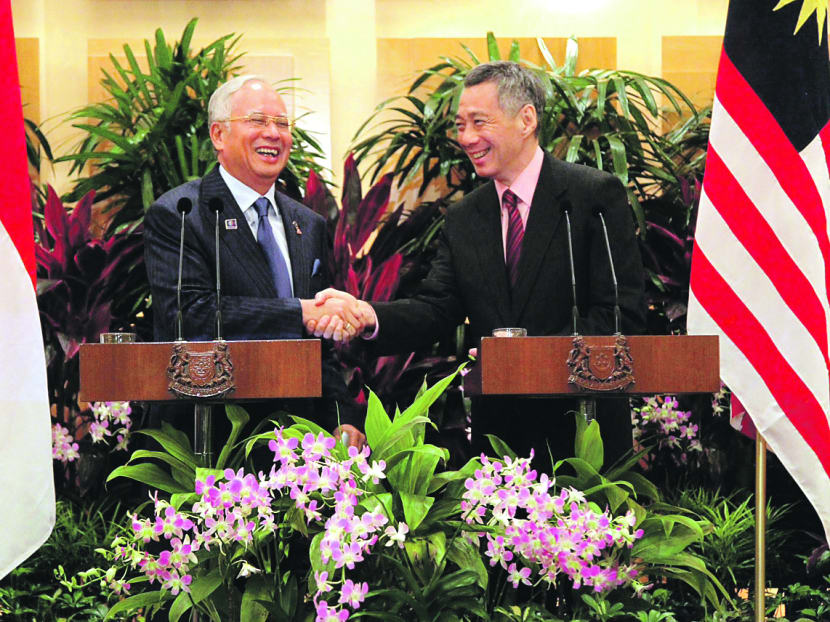High-speed rail a ‘game changer’
SINGAPORE — With several joint projects between Singapore and Malaysia in progress following the landmark resolution of a decades-long dispute over railway land, the two governments yesterday announced another historic agreement: The construction of a high-speed rail linking Singapore and Kuala Lumpur in 90 minutes, a move which both Prime Ministers said will be a “game changer”.

Malaysian Premier Najib Razak and PM Lee Hsien Loong affirming their warm ties during a press conference at the Singapore-Malaysia Leaders’ Retreat yesterday. Photo: Don Wong
SINGAPORE — With several joint projects between Singapore and Malaysia in progress following the landmark resolution of a decades-long dispute over railway land, the two governments yesterday announced another historic agreement: The construction of a high-speed rail linking Singapore and Kuala Lumpur in 90 minutes, a move which both Prime Ministers said will be a “game changer”.
The announcement came during a retreat between Prime Minister Lee Hsien Loong and his counterpart, Mr Najib Razak — the pair’s fourth since the inaugural meeting in 2009.
At a joint press conference yesterday, Mr Lee said the high-speed rail link will be a “strategic project for the two countries” as it will allow people in two cities to see themselves as “one virtual urban community”, citing the example of London and Paris, which are linked by Eurostar.
“I think it’s going to be a game changer. It will transform the way people interact, the intensity of our cooperation and the degree to which we become interdependent on one another and, therefore, have stakes in each other’s success,” Mr Lee said.
Added Mr Najib: “Our two cities will complement each other, our two countries will look at each other differently and the opportunities are boundless between our two countries.”
Malaysia’s target completion date for the rail link is 2020. Mr Lee pledged the Government’s cooperation to try to meet it once the Republic has studied the plans and details that are being worked out by Malaysia.
Mr Lee added that he felt building the rail link was a good idea when Mr Najib first mooted the suggestion to him a few months ago. “At this retreat, we decided that we should make a statement that ‘Yes, we want this, we’re working towards this’ and I think we can make it work,” Mr Lee said.
The plan to build a high-speed rail link between Singapore and Kuala Lumpur was first floated in the late 1990s and saw a push in 2006 when Malaysian conglomerate YTL submitted an RM 8 billion (S$3.2 billion) proposal to the government. In 2010, it was identified as a project under the Malaysian government’s Economic Transformation Programme, with proposed stops in Johor, Malacca and Negeri Sembilan.
Asked yesterday about the estimated cost of the planned project, Mr Najib declined to reveal the figures because they were “too preliminary for us to reveal to the public”, but noted that their initial studies have shown that it is “doable” as a business model.
Plans are for the project to be a private-public partnership where private firms will run the project with strong government participation and infrastructural support, he added.
The rail line is the latest agreement between both countries since Mr Najib took office in 2009.
During the retreat, both leaders reaffirmed their commitment to a “stronger and mutually beneficial partnership, especially amid an uncertain global economy”, adding that the joint projects from the 2010 agreement reflected the high degree of trust and complementarity between both countries.
They added that they hoped to maintain steady bilateral relations which they can strengthen over time.
They discussed several other issues, including cooperation on water supply, transboundary environmental concerns, as well as expanding the digital dividend radio frequencies.
Both leaders yesterday visited the work sites of two of the joint projects — Marina One in Singapore and two wellness developments in Iskandar — borne out of the 2010 Points of Agreement deal.
Asked what impact the impending Malaysian elections — which must be called by April 28 and polls held within 60 days — will have on bilateral ties and the joint projects, Mr Najib said continuity is important as these are long-term developments. “The essence of making things happen is that you need continuity and stability, which works out to, you know, it’s quite obvious what that means,” he said.
Mr Lee added quickly: “We would like continuity and stability, too.”











